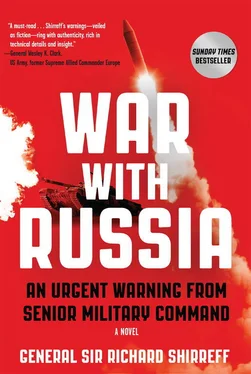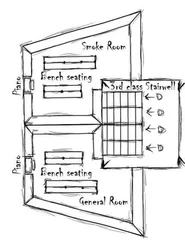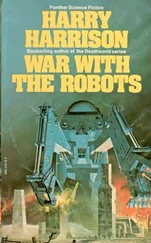He stopped.
Howard was deep in thought, facing the eternal dilemma of the commander who must make the decision to commit men to battle with all its deadly consequences. He turned to McKinlay. “What do you reckon, Dave? High risk if the Russians counter-attack before we can build up an adequate force on the ground. Even if we do and we send in the ARRC to reinforce them, we’ve got precisely the attritional, conventional, land battle we’re looking to avoid. Besides, I’m not sure the Alliance will hold together if we get stuck into a major punch-up in Kaliningrad.”
“Especially as it’s a battle they did not even know we were going to start, so they can say it’s a battle they never authorized,” McKinlay mused.
“Are you now saying you’re not sure, Dave?”
“No, SACEUR, I’m not saying that. In fact we are only a few hours away from capturing the Russian nuclear batteries. There is no indication the Russians have any idea about what is to hit them. Which means the deception plan is working. Which also means we have a fallback plan, of sorts.”
“What do you mean, Dave?”
“The moment we have their missile bases, the whole strategic picture changes. That’s always been our thinking. And, even if Rasputin does not work, or only works for a short time, then we still have our hands on one hundred Russian nuclear missiles…”
“Sir?” It was Skip Williams.
“Yes?” Howard looked momentarily irritated at the interruption.
“DSACEUR’s right on the money. The ODAs each have a couple of guys who’ve been specially trained on the wiring of the Iskanders and more are going in with the air assault. They reckon that it will take about thirty-plus minutes to turn one missile round and, under our control, to target Russia. Once they’ve sorted out how to do one, the next ones will be far quicker. They plan to get a minimum ten Iskanders in each battery facing the Russians before there is any counter-attack. That really is a potent threat to back off or else.”
Howard listened intently. “I like the sound of that, Skip… I guess if we only have ten Iskanders ready to launch at Russia, that’ll be enough of a propaganda coup to humiliate the President and force a climb-down. Then it’ll be up to the politicians to offer him a way out. Whatever happens, even if Rasputin is overcome and they recapture the batteries, the Russians will have no idea how many nukes will work or what they’ll do if they fire them. Once we’ve had control of them, for even a short time, the Russians won’t dare to use them until they’ve all been stripped down and checked… Hell!” He slapped his thigh and grinned. “This is like a nightmare terrorist plot, on speed. And for once we’re the goddamn terrorists—we’re the ones doing it! It sure makes a change from being the ones being kicked, doesn’t it, Dave?”
McKinlay laughed as well. The Admiral was right: it nearly always felt better to be attacking than defending. “Full marks to us for lateral thinking. And it’s not a plan you’d find in a Staff College solution anywhere west of Syria. Which is why the Russians won’t have thought of it. But if Rasputin works—which it will—it offers us the genuine chance of winning the war at a stroke. We’ll hold the Russians to ransom with their own nuclear weapons until they extract from the Baltic states. It is a solution that will see the minimum number of casualties for the maximum amount of effect. Which is why I have always supported the plan… as you know.”
Howard nodded his agreement and so McKinlay continued. He knew that, while the buck stopped, ultimately, with the Strategic Commander, as his deputy he was there to support, reassure and share the burden of command. And that meant committing properly to the plan.
“To summarize: high risk, but not yet a gamble.”
“Thanks, Dave. I appreciate your full support. I believe we’re decided then, gentlemen.”
“There’s one other thing, SACEUR,” added McKinlay. “Thanks for agreeing to 3 Para helping to secure the site at Pravdinsk. That’s a good call for us. They’ve been training with the 82nd Airborne. I’m told they’ve even been jumping out of American planes with American parachutes. Not that they’re going to jump tonight, of course.”
“Too right,” added Williams with a grin. Decision made, it was time to lighten up. “I gather they’ve been having an airborne ball and not a Marine has dared to show his ugly—”
“Hang on…,” McKinlay immediately started to protest.
“It’s good to see the Special Relationship is alive and well, guys,” Howard said, interrupting and shaking his head in amusement at the age-old rivalry between the green and red berets.
Then he turned to Williams, his face now grave and obviously all too aware of the consequences of his next order. “Let’s roll, Skip.”
0045 hours, Sunday, July 9, 2017, Central European Time
0145 hours, Sunday, July 9, 2017, Eastern European Time
Command Bunker, Iskander Missile Battery Pravdinsk, Kaliningrad
MAJOR ANATOLY NIKOLAYEVICH Vronsky put his head round the office door, only to see Major Pyotr Petrovich Luzhin, the Pravdinsk Guard Force commander, slumped over his desk, head on his arms and snoring loudly, a half-finished bottle of vodka open beside him.
Typical MVD, Internal Troops , he thought to himself, and these are the people responsible for guarding strategic assets like our Iskander batteries!
Picking up his body armor, helmet and webbing from where he’d left it in Luzhin’s office, he slung his AS Val assault rifle over his shoulder and walked down the corridor to the Guard Force Ops Room, where his team were monitoring the surveillance equipment covering the approaches to the perimeter wire. Underneath the Guard Force Ops Room, in the bunker below, was the Top Secret nuclear command and control room, with access only for those cleared at the very highest level.
Vronsky could understand Luzhin’s annoyance. He had arrived the day before with his men and equipment in two trucks. The fat, puffy-faced major with the colorless face had been surprised by the arrival of the Spetsnaz officer wearing no rank or insignia on his combat smock. Surprise had then turned to barely repressed anger when Vronsky had told him that, on General Kirkorov, the Commander of Western Military District’s orders, he was taking over command of the defense and protection of the Iskander compound.
“But Anatoly Nikolayevich,” protested Luzhin, “my men are more than capable of defending this compound. I have a well-planned program of mobile and foot patrols to ensure that the ground defense area out to five kilometers is properly covered. The perimeter is guarded, as you can see, by watchtowers, each with night vision devices and machine guns, which also cover the minefield. I also keep a Quick Reaction Force at immediate notice to move and I insist that my officers are out regularly to check that the soldiers are performing their duties in accordance with my orders. I can assure you, no enemy has dared come near this compound. What more can the general want?”
“I understand, Pyotr Petrovich.” Vronsky was diplomacy personified as he explained the position to his fellow major. “I appreciate that it is unorthodox for one major to give instructions to another, but I regret that I can say very little. I am here by Presidential direction, so I have to ask for your full support. This mission is of strategic importance to Russia and hence a task for Spetsnaz. I will report to General Kirkorov that I found everything here in first-class order, but please withdraw your patrols into the compound. However, I will ask that you maintain your QRF at immediate notice to move and double up the guards in the watchtowers.”
Читать дальше












